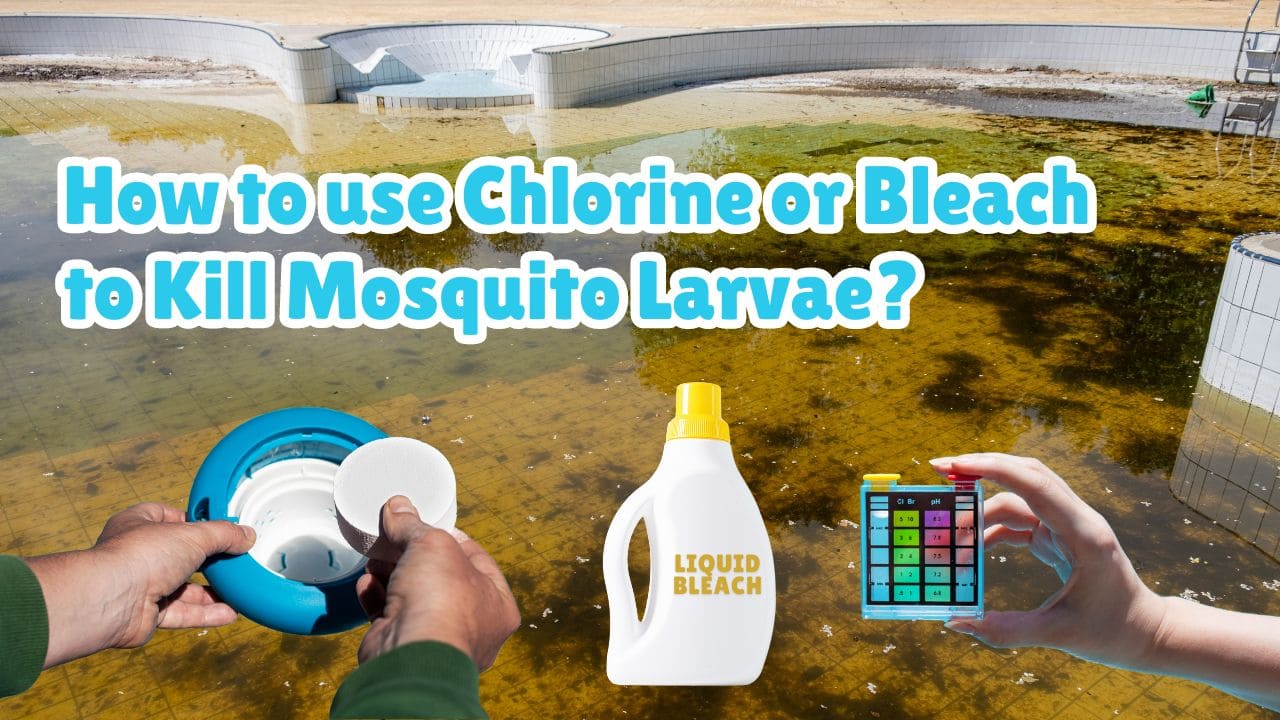Table of Contents
Can chlorine or bleach kill mosquito larvae?
Chlorine is very effective in killing bacteria, algae and other harmful organisms including mosquito larvae in many water bodies like ponds, fountains, water features, swimming pools, etc. It is a very effective disinfectant, also used to treat supply water intended for household and drinking purposes. One of the most important usage is using chlorine or bleach to kill mosquito larvae in pool water.
Yes, chlorine or chlorinated bleach like Sodium Hypochlorite (NaOCl) can be very effectively used to kill mosquito larvae. In this article, we will see how active chlorine acts as a larvicide and kill mosquito larvae to control mosquito population effectively.
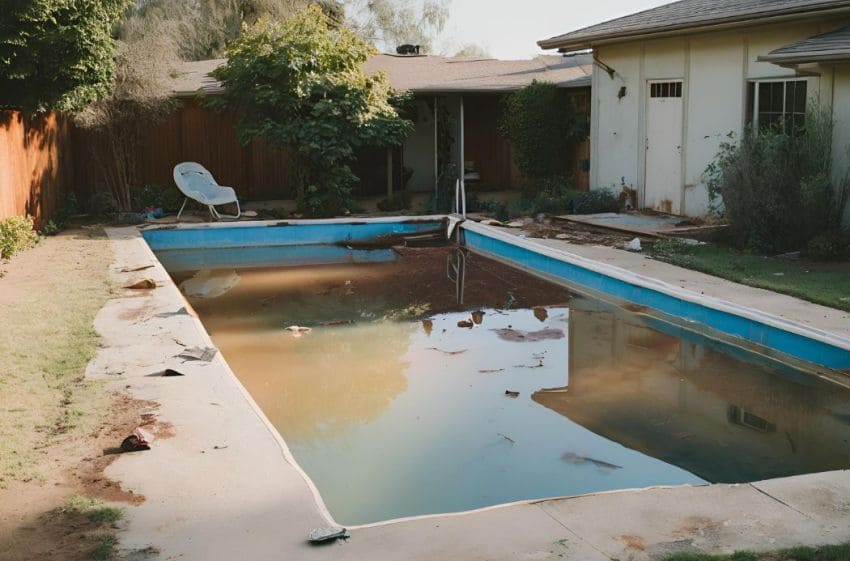
Image Credit: MosquiTalk.com
How chlorine and bleach differs from each other?
Chlorine is not directly used to kill mosquito larvae, as it is available in gaseous form. The chlorine when dissolved in water forms an unstable acid called as Hypochlorous acid or Chlorine hydroxide, which is the concentrated form of chlorine water.
Chlorine for killing mosquito larvae is actually Calcium hypochlorite, a white to yellowish white powder which we generally use as a larvicide to treat pool water. This is available in granular or tablet form and chemically it is Calcium hypochlorite Ca(OCl)2, which contains around 65% or more active chlorine. While the commercial strength of pool-grade chlorine based disinfectant are 30% and 70% available Cl2.
While bleach is slightly different, and is chemically Sodium Hypochlorite (NaOCl). It is available in liquid form and its commercial strength varies from 5%, 10%, 12% of available Cl2 etc., as per intended use. Since, it is chlorine based, it is also called as chlorine bleach or liquid bleach.
However, there are non-chlorinated bleach also like Hydrogen Peroxide (H202), Peracetic acid or Sodium percarbonate, but these do not release chlorine and are not useful as larvicide.
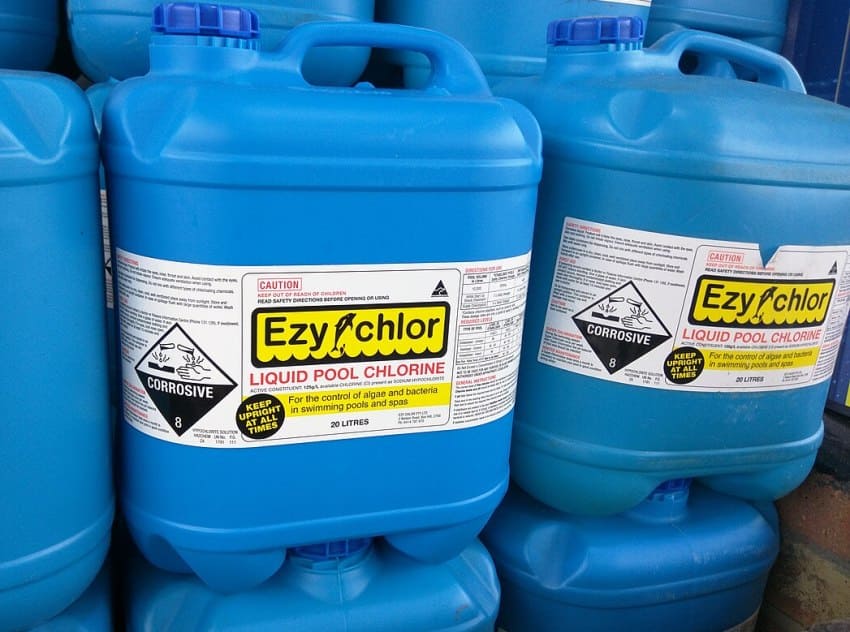
Image Credit: Wikimedia by Maksym Kozlenko | Content License
How chlorine or chlorinated bleach works to kill mosquito larvae?
Chlorine and liquid bleach both works similarly by releasing active chlorine molecules when mixed with water. This chlorine breaks down the cellular structure and gut lining and destroys the metabolism and respiratory functions of mosquito larvae. It creates chlorine toxicity with subsequent degradation within their body.
Also, the organic matter on which larvae feeds on gets oxidised and the larvae are deprived of food source and are unable to develop. This chlorine imbalance in the water body causes oxidative stress and eventually leads to their death.
How much chlorine to kill mosquito larvae?
For killing mosquito larvae, we need to maintain the ideal chlorine level for a pool which is around 1 to 3 ppm of chlorine in pool water to avoid any mosquito infestation and larval growth. This chlorine larvicide concentration is safe for swimmers and therefore no harm when it comes in our skin contact.
However, if the pool water is left unattended and if you see any signs of larval growth, than you have to give a chlorine shock treatment by increasing the bleach dosage for larvae to chlorine levels of above 10ppm or sometimes even higher upto 30ppm. These levels will kill mosquito larvae, algae, bacteria, and chloramines in your pool.
This shock treatment cannot be done with pond water where other organisms like fishes, frogs, tadpoles, waterfowls (duck, geese) etc. are there, and it can also affect other useful insects, birds and pets.
In case of chlorine pool shock treatment, a sitting period of around 3 to 4 hours is allowed during which the chlorine will kill the larvae, and than the chlorine levels are brought back to the normal range of 1 to 3 ppm.
If due to some reason it is not possible to give pool shock for mosquitoes, you need to maintain the chlorine concentration in the pool to around 3ppm for atleast 24 to 48 hrs which will then kill the mosquito larvae.
Liquid bleach (Sodium Hypochlorite) of concentration 12% means, 120 gpl (grams per liter). And 1gpl is equivalent to 1000ppm (parts per million).
Calculation:
Assume the volume of water in your pool to be approx. 100,000 liters, and since 1gpl is equivalent to 1000ppm, than 3ppm means 0.003gpl. It means to achieve 3ppm of concentration in your pool water, with the help of simple cross multiplication:
1000ml of liquid bleach ==> has 120gpl of chlorine,
X ml of liquid bleach ==> will have 0.003gpl of chlorine
X = 0.003 x 1000 / 120 = 0.025
0.025ml of liquid bleach (120gpl) will contain 0.003gpl of chlorine.
…it means for each liter of pool water, you have to add 0.025ml of liquid bleach (120gpl)
Therefore, for 100,000 liters of pool water, you need to add 2,500ml or 2.5litres of liquid bleach of 120gpl concentration.
How to get rid of mosquito larvae in pool?
We can use either mosquito dunks or chlorine bleach. Mosquito dunks are also safe and very effective in killing mosquito larvae. But, using chlorine bleach as a larvicide is the most widely used method for getting rid of mosquito larvae in pools.
How to kill mosquito larvae with chlorine bleach?
Here’s a step-by-step guide for mosquito breeding prevention using chlorine larvicide in swimming pools, spa’s and other water bodies like fountains, water features, etc.:
- Test the chlorine level in water before adding any chlorine bleach: If the water already contains some chlorine than you may need to add only the required quantity of chlorine bleach to make up the required concentration say like 5 to 10ppm for shock treatment in pools with mosquito infestation.
- Add Chlorine bleach: You can add chlorine bleach by calculating from the above method or simply follow the manufacturer’s guidelines if you are using any commercial product. For larger pools and frequent usage you may need to add chlorine every alternate days or after every few days.
- Circulate the water: While adding chlorine, circulate the water with the help of pump to distribute it evenly throughout the water.
- Monitor and adjust the chlorine levels: You have to monitor the chlorine levels using pool test strips or pool testing kits which will give you chlorine levels and pH of the pool water. If there is any drop in chlorine levels below 1ppm you need to increase the dosage.
- Remove the dirt and debris: Any organic matter like dried leaves, dirt, etc. will utilize the active chlorine available in the pool water by undergoing oxidation. Thus, to avoid any unwanted oxidation and decomposition of chlorine you have to keep the pool water free of dirt and debris.
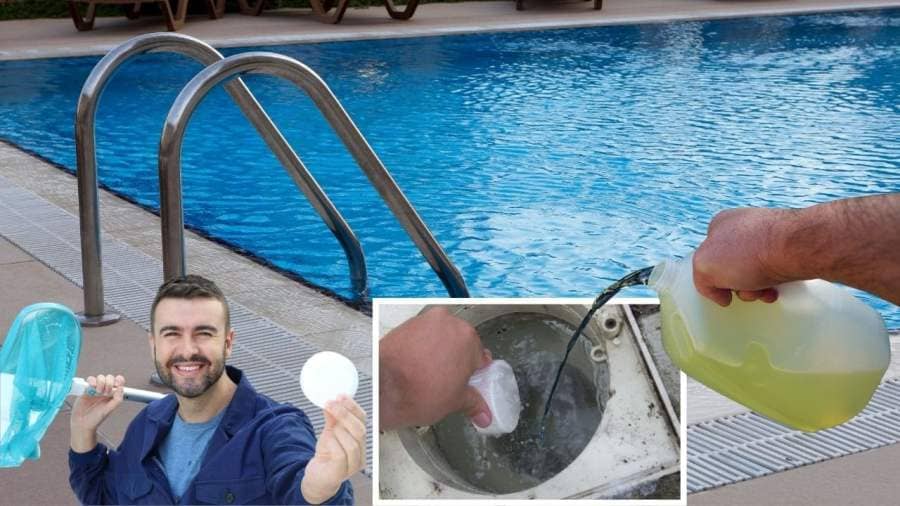
Image Credit: Designed by Canva Pro
NOTE: Always remember, do not stock up liquid bleach as they are very unstable and decomposes soon under the influence of light and moisture. Theie efficiency and effective concentration goes down if hiold longer. Always buy in limited qualtities as per your usage.
How long does it take for chlorine or bleach to kill mosquito larvae?
The rate of decomposition of chlorine as well as bleach is slightly different. The calcium hypochlorite, i.e., chlorine releases the active OCL– anions at a much faster rate than bleach. Therefore, it is assumed to give faster results, but since there is no means to measure the efficiency of the oxidation process against germs, microbes and larvae, we consider similar settling period for both.
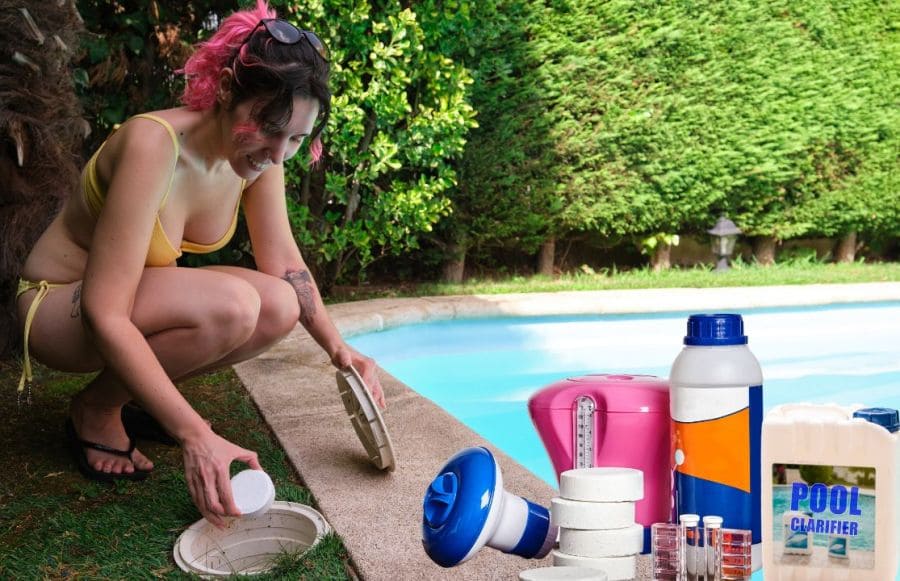
Image Credit: Designed by Canva Pro
Daily chlorine levels should be between 1 to 3ppm which will keep mosquitoes away from laying eggs. But incase the mosquitoes have already laid eggs and there are signs of larvae and mosquito breeding in the pool, than you need to give a shock treatment with 5 to 10ppm of active chlorine for 4 to 6 hours. And then again reduce the chlorine levels between 1 to 3ppm and maintain it on a regular day to day basis.
Chlorine as said before is commercially available as pool disinfectant, in higher concentrations around 30%, 65% or 70% while the concentration of bleach is very low around 5% to 12%. Therefore, to achieve 3ppm of chlorine levels in your pool you need to add huge quantities of bleach, and since it is very diluted form of chlorine, its transportation and packaging costs makes it expensive to use as pool disinfectant.
On the other hand, chlorine is far better as it is available in concentrated packages which are easy to carry and move, and is also available in form of granules, tablets or powders.
Which is better for pools, Chlorine or Liquid bleach?
Chlorine is Calcium hypochlorite which leaves calcium behind causing scaling and slimy inner walls and floors of the pool. But since it is solid it can be easily transported and used without any danger of spillages.
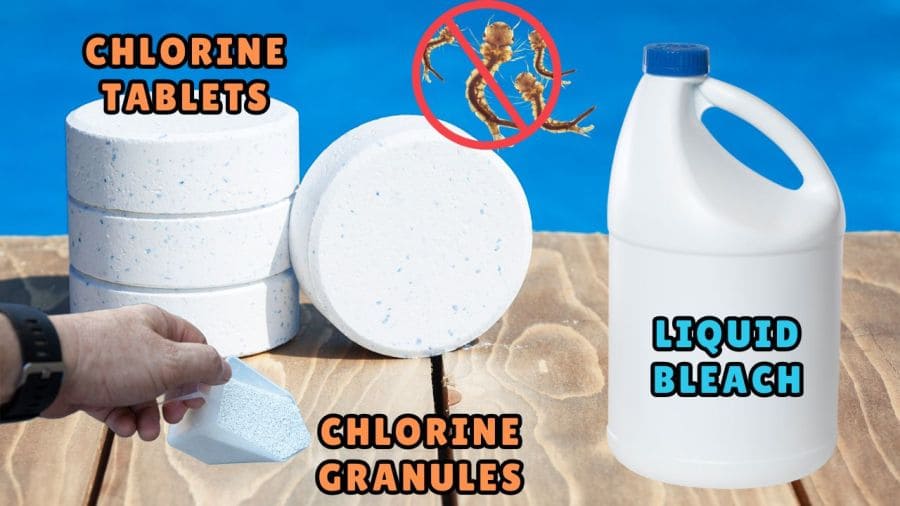
Image Credit: Designed by Canva Pro
While liquid bleach has a slower rate of chlorine release so the actual oxidation process will be slightly slower than the calcium hypochlorite which releases the active OCl– anions at a faster rate.
Cost-wise Chlorine is cheaper and suitable for large pools and water bodies, while liquid bleach is much better to use in smaller areas like puddles, marshlands, gutters, etc.
Conclusion
Both chlorine and bleach are effective disinfectants and useful as a larvicide. They helps in controlling mosquito population. Bleach is useful in small stagnant waters like puddles, fountains, septic tanks, etc. while the chlorine or calcium chlorite is suitable for larger waterbodies like swimming pools.
By proper usage regular treatment of swimmimng pools and stagnant water bodies, we can control mosquito population around our home.
Many commercial products from Pool Store, Kroger are available in market. Follow manufacturer guidelines as these chlorine based chemicals are toxic to skin and these in their concentrated forms releases fumes which affects the eyes and respiratory tracts.
Store and use it under the supervision of adults. Make use of safety gloves, goggles, gumboots, etc. Avoid direct contact with eyes and skin while handling the concentrated product.
Frequently Asked Questions (FAQs)
-
Can Dettol kill mosquito larvae?
Mosquito larvae are affected by toxic disinfectants like dettol. Dettol is found to be effective against mosquito larvae as it damages the internal cellular structure and metbolism functions. When dettol is added in a strong concentration and left for about an hour it is found that most of the larvae dies and comes at the surface while few still alive but struggling for life.
-
What is the natural predator of mosquito larvae?
Natural predators like mosquito eating birds are very effective in reducing the population in your surrounding. You should attract these birds by installing nest boxes, bird houses, bird feeders and bird baths. While there are other mosquito predators like dragonflies, gambusia fish, goldfish, spiders, tadpoles, bats, etc.
-
What is the best chemical to kill mosquito larvae?
Dettol, Dish soap, BTI larvicide, Vinegar, Vegetable oil, etc are few effective chemicals and household items that can reduce or kill mosquito larvae in any standing water. However their use depends on the volume of standing water and presence of any other organisms.

